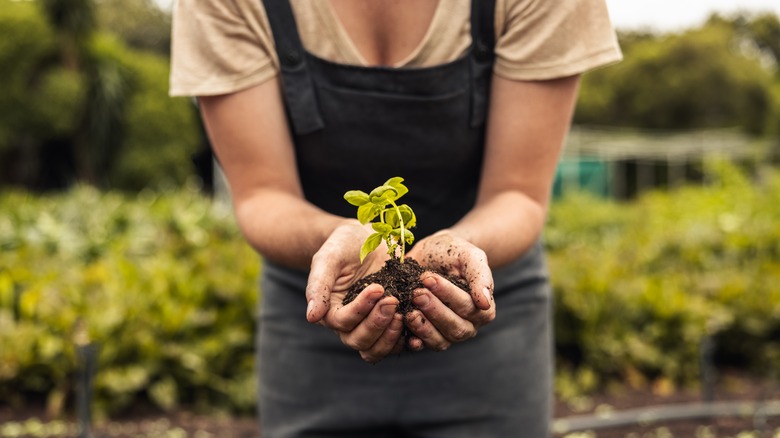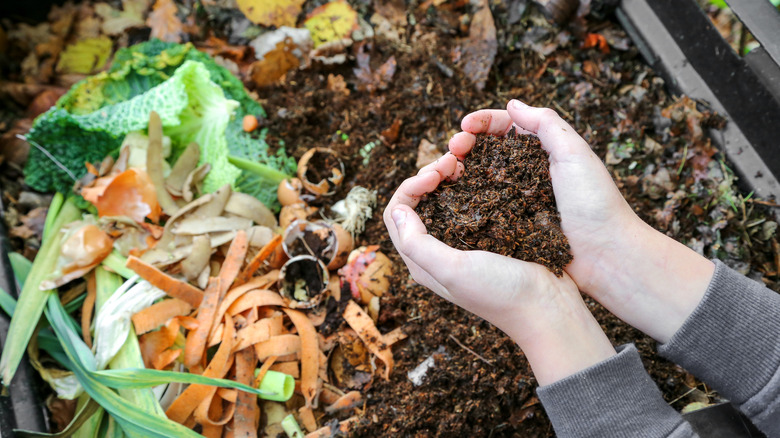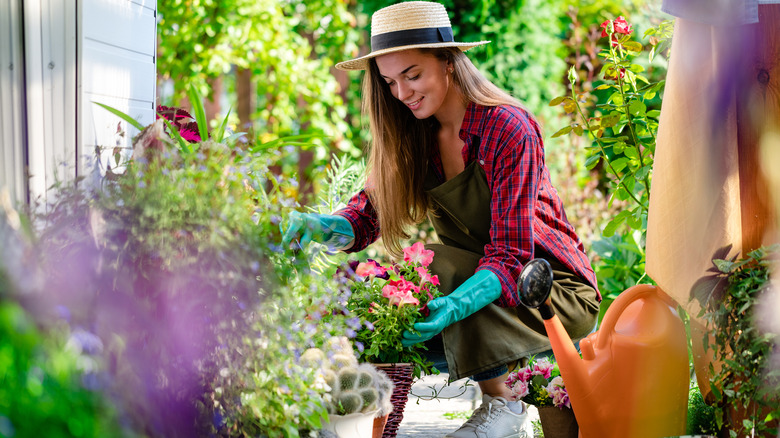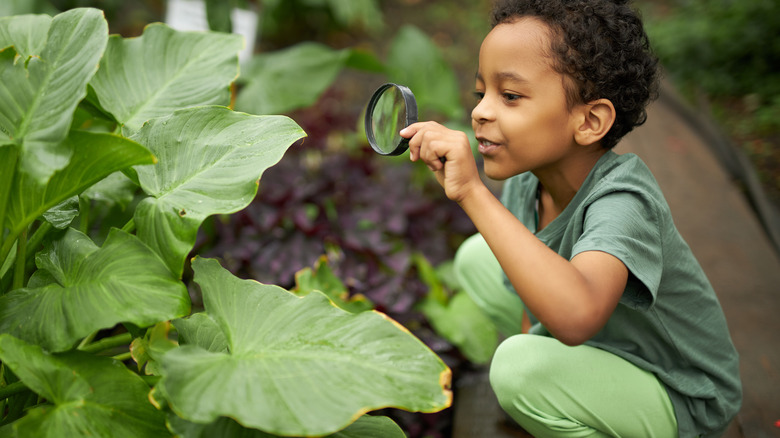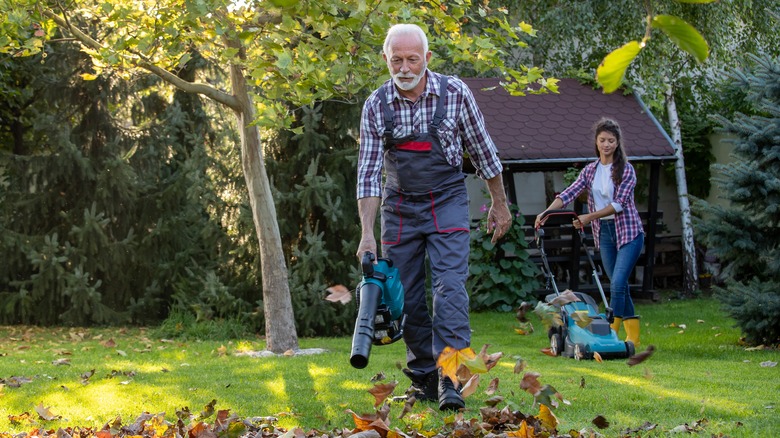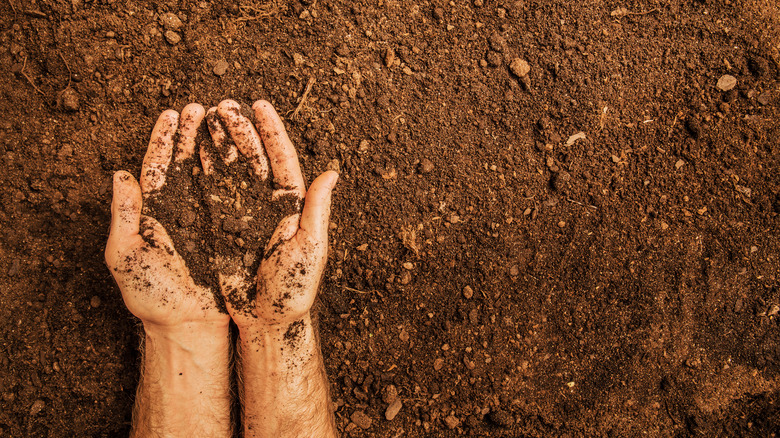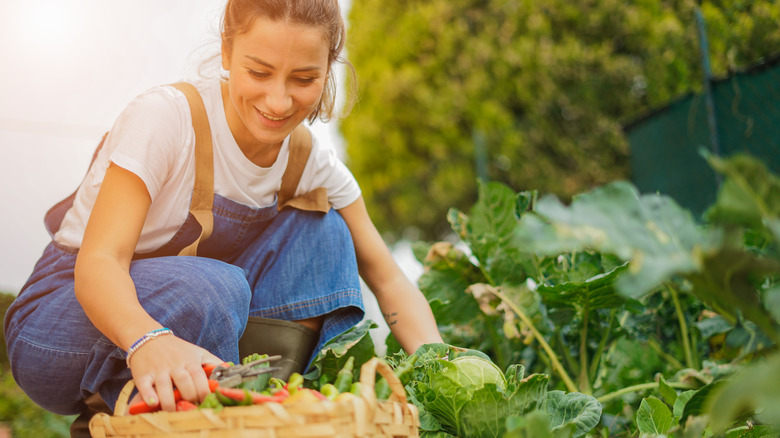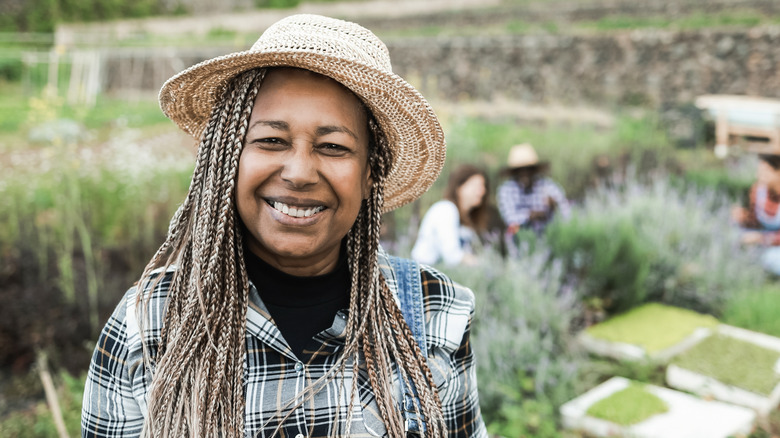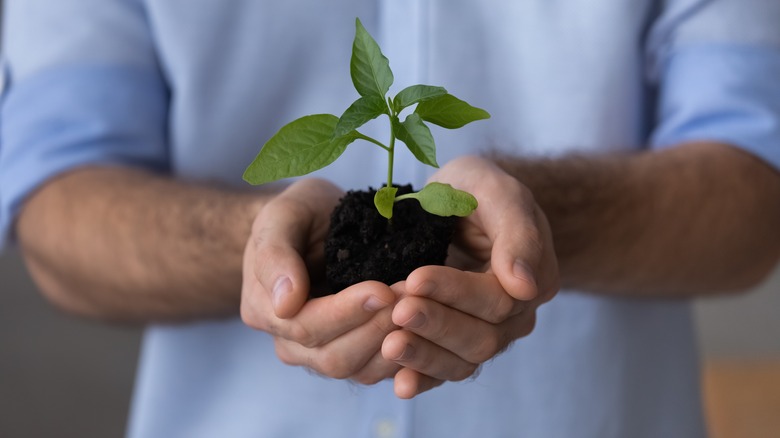How Gardening Can Be Unexpectedly Good For Your Health
Since time immemorial, humans have loved to garden. The connection between people and nature goes back way longer than all of us have been alive, and from the days of hunter-gathering to our contemporary obsession with houseplants, we've always had green thumbs. And it looks as though our love of tending to flowers and spending time in vegetable patches shows no signs of slowing down. Over three-quarters of all American households spend time, energy, and money on their gardens, according to GlobeNewswire, with approximately $2.5 billion spent annually in the United States on gardens (per data from the National Gardening Association, via Your Green Pal).
But here's the thing. Gardening can act as a gloriously peaceful pastime and an excellent way to get fresh produce onto your plate, but the reason why we really love it? Because it's seriously good for your health. You might not think it, but simply pottering around in your garden can provide you with a range of health benefits, and we're here to lay them out for you. So grab your spade, and let's dig in.
Gardening is good for your heart
We all know that gardening is good for the soul, but did you know that it's pretty good for your ticker, too? It's easy to forget it, but gardening is a physical activity, and all of this movement provides a fitness post, says Robert Hutchins, internal medicine physician for UNC Health, via UNC Health Talk. "It's hard work to garden, and it provides some cardiovascular benefit," states Hutchins. Research has even found that gardening, alongside other household tasks like DIY projects, can lower the risk of cardiovascular disease and complications among older people (per WebMD).
In fact, the amount that you could boost your heart rate — and burn calories doing so — by gardening may surprise you. Simply pottering away in your garden by planting flowers and herbs and digging up weeds could see you burning up to 400 calories per hour, according to WebMD. More heavy-duty work, like landscaping or moving dirt from place to place, may even allow you to burn 600 calories hourly. If you want to make it challenging for yourself, manual tools are always better for energy expenditure than electric ones, so swap out your motorized hedge trimmer for regular clippers. You'll probably save money doing this, too!
It may reduce symptoms of anxiety
We all know that the garden is a lot of people's happy place, but what's incredible is how impactful simple gardening can be on anxiety symptoms. A meta-analysis published in Preventive Medicine Reports examined the overall effects of gardening on health, with a particular focus on its impact on mental health. The researchers found that across several studies, gardening was found to decrease anxiety, as well as provide a benefit for people experiencing other mental health conditions like depression.
So why is gardening so good for anxiety? It all comes down to being in nature and doing a task while doing so, according to Anxiety.org. Wiling away the hours outdoors can allow you to keep your emotions in check more easily and thereby keeps anxiety in check. Spending your time on tasks in the garden, free of distractions, also lets you remain mindful and better embedded in your physical surroundings, with mindfulness practice being a useful treatment path for both anxiety and depression.
Gardening with kids may help them eat more vegetables
There are few universal truths in this world, but one thing you can count on, along with the sun rising and setting each day, is the almighty challenge of getting your kids to eat their greens. And we get it: Until we grow up and recognize the nutritional value of vegetables, they can be a hard sell. But we've got some good news for you, folks: One of the best ways of encouraging vegetable intake in children is by getting them into the garden. A study published in the International Journal of Behavioral Nutrition and Physical Activity followed several thousand school-age children over a year, and found that when a school-based gardening program was followed, combined with nutrition and cooking education, they ate more vegetables overall. This could then lead to better habits throughout the rest of their lives.
It's important to remember the importance of getting your kids to eat vegetables extends far beyond you just being able to say they're getting their five-a-day. Vegetables safeguard your children's health, supplying them with crucial anti-oxidants, fiber, and vitamins, and reducing the risk of chronic conditions (per the Raising Children Network).
Regular gardening will make your hands stronger
Gardening can be eminently relaxing and peaceful, but don't underestimate the amount of hard work you put into a gardening session. And all of this physical labor can benefit one part of your body in particular: Your hands. This is especially true among older adults, as researchers from Kansas State University observed in a study published in HortScience. "One of the things we found is that older adults who are gardeners have better hand strength and pinch force, which is a big concern as you age," states professor of horticulture at Kansas State and study author Candice Shoemaker via Science Daily.
It's important to note, too, that the tasks involved in the study weren't particularly strenuous or difficult, but commonplace gardening activities like filling up pots and mixing soil. The researchers also found that after the study, the people who took part reported better feelings of self-esteem. Although the study group was small, Shoemaker asserted that with a larger pool of people, they could expect to see more benefits, "including in areas like sleep quality and life satisfaction."
Gardening will increase your vitamin D levels
Vitamin D, also known as the sunshine vitamin, can be in frighteningly low quantity for a lot of Americans, with well over 40% of U.S. citizens deficient in it, according to research published in Nutrition Research. But one of the best ways you can top up on your vitamin D levels is by getting out in nature, and into your garden. According to a study published in PLoS One, gardening regularly served to reduce vitamin D deficiencies in older adults, regardless of what time of year it was. Other activities like cycling were also seen to boost vitamin D levels.
This makes a lot of sense, given that when you're out in the garden, you're getting way more exposure to natural light. And it's important to remember, too, the enormous effect that vitamin D has on your health. Getting sufficient vitamin D is hugely important for maintaining bone health and reducing the risk of fractures, a big consideration for older people (per the Harvard T. H. Chan School of Public Health). Having adequate vitamin D levels is also important to keep your immune system functioning correctly, and could even lower the risk of overall mortality.
It will help you build muscle
Okay, so we're not about to suggest that gardening should take the place of the gym if you're trying to build rippling abs and bulging biceps. But there's no getting away from the fact that gardening regularly is pretty good for muscle tone. When you're gardening, you're performing a range of full-body activities and smaller ones alongside those, that'll target all of your major muscle groups, explains Maryland Primary Care Physicians. As you cart around bags of dirt from place to place and drag around your wheelbarrows or waste containers, you're doing movements that are similar in function to working out with weights in the gym. And all of that reaching into far-away flower beds will provide your muscles with a good old stretch, too.
Remember, though, that like working out with weights, it's important not to overdo it. Make sure you're taking breaks, performing any movements carefully, and not overworking one muscle group and ignoring another one. And always ensure, as with working out, that you're gardening with good form: The last thing you want is to pick up a heavy sack of mulch without using your legs and end up with an injury.
Gardening will help strengthen your immune system
Maintaining a robust immune system is one of the most important things you can do for your health. But how do you make your immune system better? Alongside eating well, exercising regularly, and sleeping enough, regular gardening is one way to do it, according to The Healthy. And it's all down to getting your hands dirty.
Research published in MicrobiologyOpen looked at how direct skin contact with soil could affect the immune system. To do this, participants in the study rubbed their hands with soils and plant-based materials, and then their skin was swabbed to test the diversity of their skin microbiome, an important factor in the fight against diseases. The researchers found that when participants were in contact with soil and dirt, their skin microbiome became higher, which had positive implications for their immunity. While this effect seemed to be short-term, the researchers proposed that further studies should be conducted to assess how the power of dirt could be harnessed long-term.
You'll make stronger social bonds
Gardening is a highly enjoyable activity when you're on your own (until you have to tackle the weeds, that is), but boy does it get more fun when you're doing it with other people. And it's more than fun, too: Gardening as part of a group, be that in a community garden or with friends or family, can generate stronger social bonds and a greater ability to practice teamwork, explains WebMD.
And having improved social bonds goes far beyond just feeling a sense of community. Feeling part of a social group and having social connections, be that with friends, family, or other people in your world, can improve your physical and mental health, as the National Institutes of Health discusses. It's even been found that having robust, healthy relationships in your life may reduce your risk of cardiovascular disease, in part thanks to the lowering of stress levels. By contrast, feeling isolated and alone could spike your risk of experiencing mental health issues like depression. All the more reason to put up with your neighbors next time they suggest a group gardening session!
Gardening could improve memory
Memory loss and a reduced capacity for mental function can be common factors in aging, regardless of whether you're experiencing an age-related neurological condition like Alzheimer's or not (per the Mayo Clinic). But the good news is, if you're a gardener, your daily activities may be working to protect your memory. A study published in the International Journal of Environmental Research and Public Health examined the effects of gardening on cognitive function, among a group of older individuals in South Korea. The gardening activities were performed in 20-minute intervals and were of overall pretty low intensity.
At the end of the gardening sessions, it was found that markers of brain function related to memory were improved pretty significantly. While this appeared to be a short-term effect, the researchers stated that the study "revealed a potential benefit of gardening activities for cognitive function in senior individuals." The scientists concluded that longer-term studies should be done to see the more extended effects of gardening on cognitive function.
Your self-esteem can improve when gardening
Let's be real: We all want to feel good about ourselves. Whether that's through feeling rewarded at work, in our relationships, or our general lives, it's important to get to the end of the day with a sense of pride. And an easy way to engender that feeling of self-worth is by getting out into your garden.
"Research has shown that regularly interacting with nature can increase our confidence and self-esteem," particularly in older people, states Lottie co-founder and care expert Will Donnelly (via Sustain Health). The seemingly simple acts of digging up weeds and planting vegetables can imbue you with a sense of purpose, and there's also a long-term effect, too, when you get to see the very real fruits of your labor come through. This boost to self-esteem can be provided through performing a relatively minimal amount of gardening. Researchers from both the University of Essex and the University of Westminster observed that it took just a half-hour a week of gardening to develop a greater sense of self-confidence and to feel better overall mental health.
Time in the garden could help prevent osteoporosis
Osteoporosis is one of the most common conditions there is, with approximately 200 million people or more worldwide experiencing it, according to research published in the European Journal of Rheumatology. In the United States, roughly 50 million people have osteoporosis, with it being far more common in older people, thanks to your bones softening and becoming more easily breakable as you get older (per the Cleveland Clinic).
As such, finding ways to manage and prevent osteoporosis are vital, and gardening could be one of the best ways to do it. Gardening gives you two key ingredients in the fight against osteoporosis, weight-bearing physical exercise and access to vitamin D. As you spend time in your garden, "You're using those muscles in a certain way that stimulates both bone and muscle strength," explains spine specialist and neurosurgeon Deborah Benzil to the Cleveland Clinic. This type of exercise can safeguard the bones effectively, and reduce the risk of breakage. And the vitamin D that you're absorbing when you garden, through direct natural light, works to improve your body's ability to retain calcium, an essential component in bone health.
Gardening could reduce your risk of chronic diseases
Chronic conditions (or noncommunicable diseases) are responsible for around three-quarters of all deaths worldwide per year, with about 41 million people dying from them, according to the World Health Organization. With the sky-high frequency of these conditions, taking personal measures to try and lower your risk of developing a chronic disease is therefore paramount, and luckily, getting out into the garden is one of the best ways to do it.
The first way it does this is through the physical exercise it provides. "Although more research is needed, recent studies have found that regular gardening or DIY can cut the risk of a heart attack or stroke, and by as much as 30% for those aged 60 and over," states Lottie care expert and co-founder Will Donnelly via Sustain Health. Additionally, when you're growing fruit and vegetables in your garden, you're supplying yourself and your family with a bounty of healthy food options which may also assist in preventing chronic conditions, as a review published in the European Journal of Nutrition shows.
Spending time in your garden could help your eyesight
A good garden is a visual feast. And aside from your garden providing a beautiful, colorful vista of flowers and plants that are pleasing to your eyes, spending time in it could also help you safeguard your eye health. This is because when you spend less time indoors and more time outdoors, you reduce your risk of developing myopia, or shortsightedness, as Optimax discusses. This could be down to the eye receiving more natural light, which aids it in remaining round and not elongating, creating the eyesight change.
This may not just be the case for your own eyes, either. If you have children, encouraging them to spend more time playing outdoors could help their eyes develop more healthily, as the Smithsonian states, although the jury is still out as to what extent it maintains eyesight. And the more time you spend outdoors in your garden, the less time you're spending sitting in front of a screen, which as Optimax discusses is another risk factor in the deterioration of eyesight, with blue light potentially contributing to macular degeneration. So put that box set down, and grab your gardening gloves. Your eyes will certainly thank you for it!
Gardening can let you think long-term and feel hopeful
Gardening may be a calming way to spend an afternoon, but the true pleasures of the activity come with long-term results. Seeing that little seedling you planted grow into a mighty oak? There's honestly nothing like it. And all of that long-term activity can affect your mindset, too. "When you garden, you expect growth and change," says Gwenn Fried, manager of horticultural therapy at NYU Langone Medical Center's Rusk Rehabilitation (via The Healthy). "When someone plants a seed and waters it, they have faith that the seed will send roots into the soil to support stems and leaves above. When people see that faith come to fruition, it helps carry the same kind of faith and hope into everyday life."
And having an optimistic outlook has larger implications than just feeling good. People who have a sunnier outlook on the world are generally less susceptible to chronic conditions like heart disease and can experience greater longevity overall, as Healthline explains. When we have more hope overall, we tend to make healthier choices, and those in turn affect our overall health, creating a snowball effect of wellness.
From small seeds grow great things, people!

